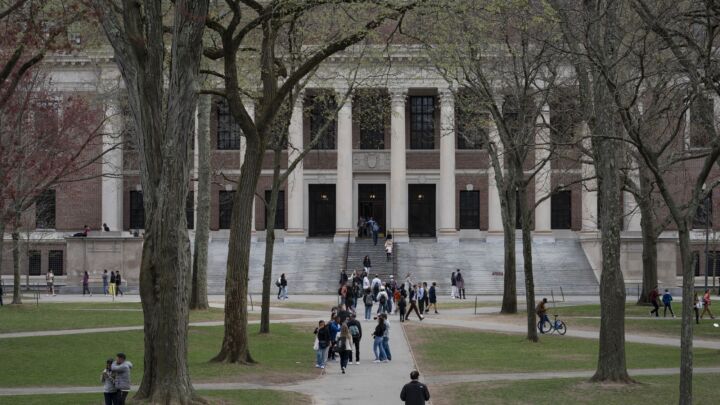Bamboo Joint: raided by the junk food cops
Patrick Hayes reports from the first fast-food outlet in Britain to be shut down because it is too close to a school.

Want to read spiked ad-free? Become a spiked supporter.
‘I almost had a heart attack.’ Nokia, the son of the owner of the Bamboo Joint Caribbean restaurant in Leytonstone, London, was expecting last Monday to be a normal working day. But then, ‘suddenly’, he says, in came ‘all of these policemen in bullet-proof vests and media and people from the council. I was shocked. You should’ve seen my face.’
Whatever questions might have flashed through Nokia’s mind at the arrival of this ominous entourage, the reality behind the mini-invasion went beyond his – and many other people’s – imagination. Bamboo Joint, which had only reopened six weeks previously after being refurbished, was being given three days to shut down partly because it was ‘within 400 metres of a school and a park’ and thus was a ‘threat’ to the health and waistlines of local children.
The Caribbean restaurant became the first fast-food outlet in Britain to be closed because of its proximity to places where children spend much of their time. What was Nokia’s immediate reaction to this revelation? ‘My first thought was “stupid people”. So many men just to serve an envelope… and for this! It was stupidity.’
Neither Leytonstone’s local council nor the Metropolitan Police has explained why so many police offers were required to serve a notice of closure, or since when it became acceptable to raid a restaurant for serving allegedly ‘junk food’ (1). The decision to close was taken by the council, ostensibly because Bamboo Joint – which had operated for four years prior to its refurbishment and reopening, according to staff – had not sought planning permission. Yet behind closed doors, and even in public, council officials say that one of the main reasons they chose to shut down Bamboo Joint is because it is too close to a school. The council recently introduced a Sustainable Community Strategy, which outlaws the building of new hot food takeaways within 10 minutes’ walk – or 400 metres – of existing schools, youth centres or parks. As a result, say officials, there is now ‘no chance of Bamboo Joint getting [planning permission]’ (2).
The new strategy was introduced in March 2009, after a consultation last year found that ‘many people disliked the noise, litter and anti-social behaviour associated with fast-food outlets’ (3). Indeed, one elderly Leytonstone resident called Patricia told me: ‘Every time a new shop opens round here, it’s always a fast-food place. It is an issue.’
The reasons given for Bamboo Joint’s closure make little sense
But what does that have to do with operating within 400 metres of a school? According to a council spokesperson, the effective ban on new hot food takeaways close to schools is part of a ‘holistic’ strategy to bring together various concerns such as childhood obesity and anti-social behaviour and to take a ‘big picture’ approach to policy: ‘something councils aren’t usually very good at doing.’
With reference to the UK government’s 2008 strategy, Healthy Weight, Healthy Lives, Leytonstone council argues that fast-food restaurants’ ‘low prices, coupled with close proximity to schools, provide added incentive to children, increasing their exposure to poor quality foods’ (4). And while tackling childhood obesity was not, according to the council, the prime reason for shutting down Bamboo Joint – the main reason was a lack of ‘amenity space for waste disposal’, apparently – council officials are unconcerned that the media have focused on the schools-restaurants-obesity element of the story. ‘We’re happy for that to be the case if it will, even in a small way, help tackle childhood obesity’, a Waltham Forest Council spokesperson told me.
Certainly council leader Clyde Loakes has been keen to emphasise this aspect of the restaurant closure: ‘We have a responsibility to look beyond the next year or two to the health of our children and young people. Obesity is a big problem for young people and we’ve got to deal with that… A lot of fast-food outlets do their business with schoolchildren, in competition with the healthy schools agenda.’ (5)
This rhetoric baffles Ms Bartlett, who was a Bamboo Joint regular before its forced closure: ‘I ate there everyday. Look at me, I’m not fat. People should be able to eat what they want.’ And schoolchildren? ‘I don’t see schoolchildren in this place. Some mums go in there to buy food for them and their kids. But this is food cooked fresh from scratch with plenty of greens and vitamins. It should not be put in the same category [as junk food outlets]. It sells rice and peas and coconut bread.’
Nokia tells me about some of the food sold at Bamboo Joint: stewed cabbage, spinach, aki and salt fish, steamed fish, ox tail, soups, rice and peas, yam and bananas, curried goat and curried chicken. ‘We didn’t cook anything deep fried, and, anyway, no juniors have £5 to spend on the food that we serve.’
The central frustration of Bamboo Joint regulars and staff is that this stretch of Leytonstone High Street is stuffed with pizza, fried chicken and fish-and-chip shops, yet their West Indian cuisine seems to have been singled out. When I visited Bamboo Joint, a regular shouted angrily: ‘West Indian food is not junk food! It’s not fish and chips!’ Placards and banners outside the restaurant express the same sentiment: ‘What is junk food?’; ‘Is fish and chips junk food?’; ‘Clyde Loakes: How do you determine fast food?’
There are many other places to eat ‘junk’ on Leytonstone High Street
Despite some lurking suspicions, however, few people think the ban on the restaurant is racially or culturally motivated. As Ms Bartlett said: ‘People know we’ve got a voice, we’ve got a brain, people know we’re not stupid. Obama is president now. Michelle is in the White House… Waltham Forest Council is just starting with the wrong people. They’re doing this all wrong.’ Rather than being racially motivated, the discussion of Bamboo Joint as a problem for young people’s health really shows how moralistic and political is the category of ‘junk food’. Indeed, some experts argue that, scientifically speaking, there is no such thing as ‘junk food’. Vincent Marks, emeritus professor of clinical biochemistry at the University of Surrey and co-editor of Panic Nation: Unpicking the Myths We’re Told About Food and Health, has said: ‘Junk food is an oxymoron. Food is either good – that is, it is enjoyable to eat and will sustain life – or it is good food that has gone bad, meaning that it has deteriorated and gone off… To label a food as “junk” is just another way of saying, “I disapprove of it”.’
The owners of Bamboo Joint plan to appeal the council’s decision ‘through the proper channels’. And no one hanging around the restaurant at the weekend believes that closing it down will have any impact at all, especially since Bamboo Joint is probably one of the healthier options amongst the borough’s 255 fast-food outlets. As Patricia told me: ‘Kids will still go out and buy fast food. Even by trying to close a few down, you’re still not going to be able to stop the children.’
Mark, a spiky-haired pupil from the nearby school, seemed confused by the whole thing. He’s never had Caribbean food – instead preferring pizza and fish and chips – but after school he only ever buys sweets, not hot food, because ‘my mum cooks for me at home and usually decides what I can have’.
Upon unveiling the new fast-food strategy at the end of last year, Clyde Loakes said: ‘We don’t want to tell people how to live their lives.’ (6) The closure of Bamboo Joint suggests otherwise. As one restaurant regular said: ‘We live in an economy where everyone can do business. It should be for customers to decide what they want to buy and what they want to eat.’ And yet the local council is effectively making decisions in loco parentis, behaving like the heavy-handed parent that knows what is best for local children – even if it runs counter to what real parents want for their kids, and counter to the local community’s decisions about where to hang out and what to eat.
Patrick Hayes is a co-founder and organiser of the IoI Current Affairs Forum.
Previously on spiked
Rob Lyons reckoned that Return to School Dinners marked the return of Jamie the tosser. Elsewhere, he called the school dinners revolution a dog’s dinner, and warned that the government was using obesity to start weighing into family life. Patrick Basham and John Luik argued that dieting is a waste of time, and told Rob Lyons that we’re being fed a diet of misinformation. Justine Brian defended cheap chicken. And Stephen Bowler wondered why we are so obsessed with our bodies. Or read more at spiked issue Obesity
(1) Fast food police: Caribbean takeaway closed down for opening too close to schools, Daily Mail, 20 April 2009
(2) First fast food outlet closed down by Council, Waltham Forest Council, 20 April 2009
(3) First fast food outlet closed down by Council, Waltham Forest Council, 20 April 2009
(4) Waltham Forest SPD – Hot Food Takeaway Shops, consultation document, October 2008
(5) Takeaway near school forced to shut, Metro, 20 April 2009
(6) Fast food police: Caribbean takeaway closed down for opening too close to schools, Daily Mail, 20 April 2009
Who funds spiked? You do
We are funded by you. And in this era of cancel culture and advertiser boycotts, we rely on your donations more than ever. Seventy per cent of our revenue comes from our readers’ donations – the vast majority giving just £5 per month. If you make a regular donation – of £5 a month or £50 a year – you can become a and enjoy:
–Ad-free reading
–Exclusive events
–Access to our comments section
It’s the best way to keep spiked going – and growing. Thank you!







Comments
Want to join the conversation?
Only spiked supporters and patrons, who donate regularly to us, can comment on our articles.